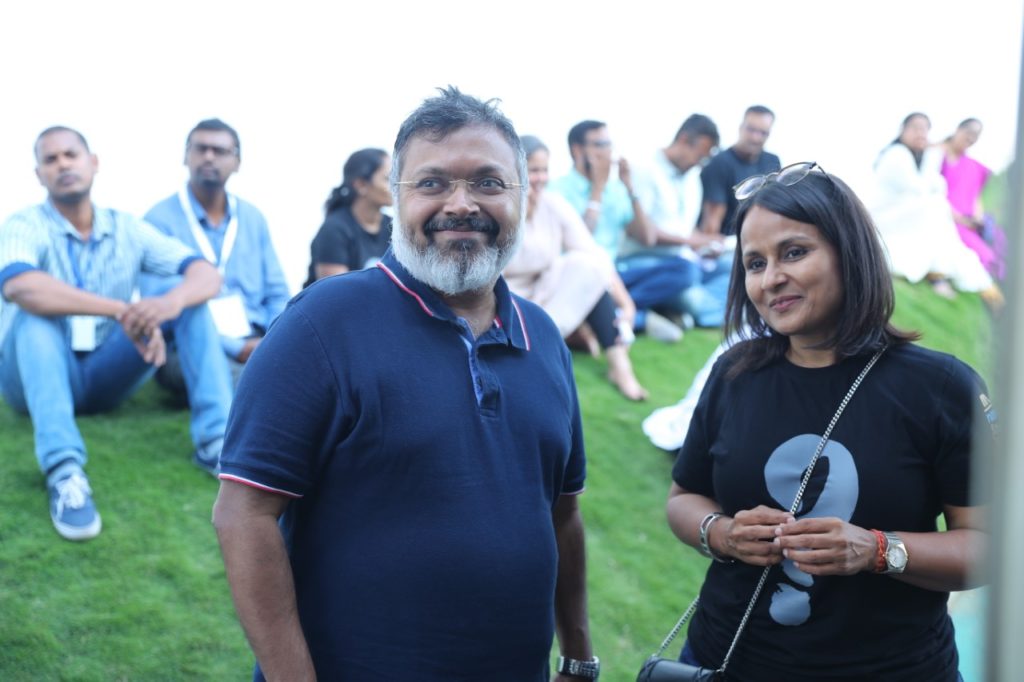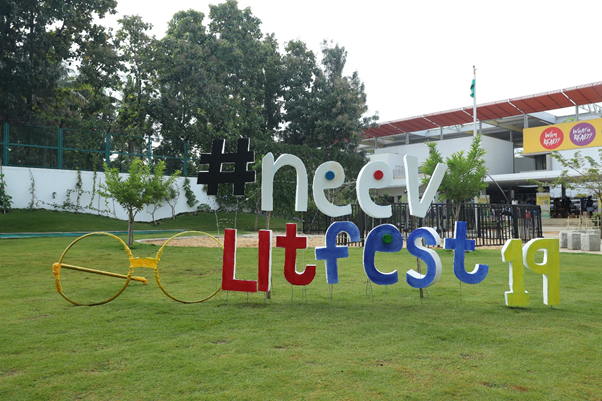The third edition of the Neev Literature Festival closed successfully, with a host of book launches, workshops, a curated book exhibition and fun activities ensuring that there is much hope for children’s literature in the country.
The bright yellow rimmed spectacles next to the hashtag neevlitfest19 welcomed me to the Yemlur campus of Neev Academy for the two-day literature festival for children. Organized by Neev Academy the event was a huge success that had 2000 plus children, 67 authors, illustrators and librarians from across the country and the world, parents and educators in attendance. With a motley set of events spanning book launches, literature conversations, storytelling sessions, book readings, workshops for children, teachers/librarians and parents, the two days were filled with all things literature.
Speaking on the event Kavita Gupta Sabharwal, Co-founder of Neev Literature Festival said, “this year we changed the programme from how authors work to the issues that matter in children’s reading. Over the two days, many things were discussed deeply like how to think about your own child’s reading and how to not fall into the zone of least resistance. Listening to so many speakers tell us that reading is paramount, but don’t control what your child reads. For children discover boundaries through literature. The changing reading patterns in a digital world. The questions on the future of Indian literature came up repeatedly as well, including with Devdutt Pattanaik, who shared in his keynote ‘Indian stories are wonderful because they have many layers.” Authors Paro Anand and Roopa Pai launched their books Being Gandhi’ and ‘From Leeches To Slug Glue’ respectively.
The panel discussions had interesting topics like The Power of Language – Shrinking expression, Local Books Going Global and revival of storytelling among others. Speaking on a session of Revival of Story Telling Jeeva Raghunath, Storyteller & Author said, “the need of the hour is that families must involve in quality time sharing stories which is a strong bonding tool. No matter how technology develops, live connection is the best. Plus let’s not leave aside stories from other cultures as now the world can be enclosed in a fist.” Likewise in the session ‘Local Books Going Global’, Shobha Viswanath, Author & Publisher Karadi Tales added, “there are two ways a book goes global. When children’s books published in India capture the imagination of foreign publishers who then want to make the book available to the children of their country in their language by translating them and when foreign distributors like an Indian publisher’s list and think it is worthy and commercially viable to distribute them in the countries where they trade.”

Among one of the key issues most parents face today is to get children into the habit of reading and this is what was addressed in the session on ‘Getting your child reading’. Bijal Vachharajani, Senior Editor,’Pratham Books’ and author advised, “read along with your child and read aloud to them. Introduce them to all sorts of books and different genres and writers. We all need to be readers to foster a reading environment to encourage children to read. Parents should set an example by engaging with reading themselves. Do not shame children by saying they don’t read. There are online forums to engage with books in the form of the Facebook group, Reading Raccoons, and BAM Books on Instagram, which help in discovery of titles.” Among the many workshops that were held was an interesting one called Workshops for Aspiring Writers and a particular topic that caught my fancy was ‘Writing the Past’, Dr. Devika Rangachari who hosted the session discussed the various pivotal requirements of any work of historical fiction with special emphasis on authenticity/ accuracy and the setting of the story. “I spoke about my work of historical fiction for young adults, Queen of Ice (Duckbill), that is about Didda who ruled Kashmir in the 10th or 11th century CE. By discussing the process of the writing of Didda’s story and showing some visuals of the sources pertaining to her reign (inscriptions, texts and coins), I highlighted the fact that writing historical fiction is not always an easy task due to the paucity of sources in a lot of cases, particularly if you are dealing with the ancient and early medieval period of Indian history, for instance.” The participants, subsequently, engaged in writing exercises to evoke historical settings of their choice, using dialogue as a means to propel their stories forward and to point to certain individual characteristics of their protagonists from history.
The six parent workshops, six teacher workshops and four aspiring writer/illustrator workshops were all well attended. Anuja Master Bose who attended a parent workshop averred, “engaging with my son’s favourites authors gave me an incredible learning opportunity – by listening to an author speak about why they write the stories they do, what inspires them, and how they practice their craft helps me extend the magic of my son’s favourite books into every part of our lives.” Nisha Mohan who attended the Librarian Workshop said, “the workshop was very good learning for me. The topic on SDG (Sustainable Development Goals) was a new topic and was helpful to get ideas on how to include SDG in our curriculum.” Likewise Aparna Joshi who attended the Teacher Workshop added, “the most important quality that makes us human is empathy. This was done through the reading of a heart-warming narrative, Oliver Button is a Sissy.” Devika Cariappa, Author who did a session called ‘Snooping about in the Past’ for the 8-11+ age group said, “the children were engaged, curious, full of questions and completely happy with their mini excavations, putting to work their newly discovered archaeological concepts.” Now isn’t that is what literature should be?
This story first appeared in The Hindu Friday Literary Review dated Oct 4, 2019 here
